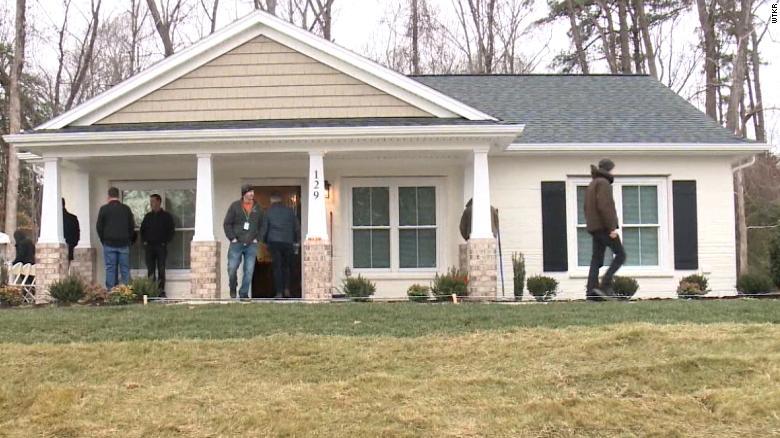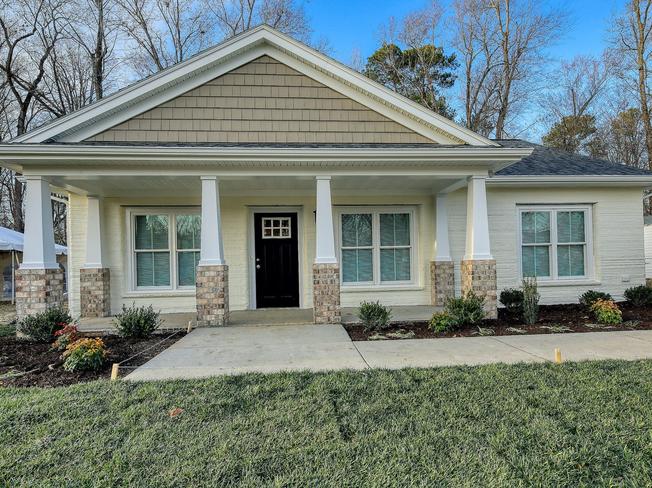
Founded in 1976, Habitat for Humanity has constructed hundreds of thousands of affordable homes for people who need them. Now, using automated computer technology and a patented concrete mix, Habitat for Humanity recently completed its first 3D-printed house in Williamsburg, Virginia. The house’s new owner, April Stringfield, and her 13-year-old son are excited to move in and make the house a home.
While 3D-printed homes are still relatively rare, the successful completion of the Williamsburg house is a testament to the growing desire to build affordable homes while conserving natural resources like trees.
RELATED: 19 Kit Homes You Can Buy and Build Yourself
Although the walls of the Williamsburg house were printed rather than stick-framed, the home is still just a regular house. In 1,200 square feet of living space, it includes three bedrooms, two full bathrooms, and a covered front porch where Stringfield can enjoy warm summer evenings.
The contractor incorporated traditional siding on the roof gables and used standard bricks on the porch pillars. In addition to the house, Stringfield received a 3D printer that will allow her to print cabinet hardware and light switch covers.
During the pandemic, some building material prices doubled or tripled primarily due to supply chain issues, which subsequently drove up homebuilding costs. By using concrete rather than wood, Alquist—the contractor that printed the walls of Stringfield’s new home—saved Habitat an estimated 15 percent per square foot.

While homebuyers do not pay for the labor needed to construct a Habitat home, they do pay for the cost of construction materials. In this way, the money saved on material costs is passed on directly to the buyer.
It took just 28 hours to print the concrete walls of Stringfield’s home. Alquist uses a patented concrete mix and impressive-looking extrusion machine to print exterior and interior walls, which are reinforced with steel during the printing process.
Afterward, the exterior walls are sealed with a clear or tinted coating that keeps moisture from transferring through the concrete. Homeowners can choose a standard gray concrete color or select from a range of attractive earth tone hues to give the home a custom look.
RELATED: These Are Some of the Most Architecturally Interesting Solutions to Homelessness
After Alquist finished printing the walls, traditional builders constructed the roof, ran plumbing and wiring, and installed interior flooring and other finishes. Through the Williamsburg chapter of Habitat, contractors, subcontractors, and other volunteers donated their time to complete the remaining parts of the house.
As a Habitat rule, new homeowners must spend some of their own time working on the project, so Stringfield put in 300 hours of sweat equity to make her new home a reality.
While the Williamsburg house is the first 3D-printed home Habitat has completed, it likely won’t be the last. The Habitat buyer program exists to help encourage homeownership for those who need housing but might not be able to purchase a home through conventional means.
Successful Habitat home applicants commit to working on the project or at a Habitat ReStore, and they learn how to budget for mortgage payments and care for their new home. The nationwide nonprofit does not discriminate when selecting homebuyers.
Automated 3D printing for homes is still in its infancy. However, computer-constructed homes are already being built and sold to the general public, such as this 3D-printed house located in Riverhead, New York. In most communities, however, standard construction is still the name of the game and will likely remain so for the foreseeable future.
Stringfield is thrilled with her new home, and she told CNN how thankful she is to have a home with a backyard where her son can play and her puppy can run.